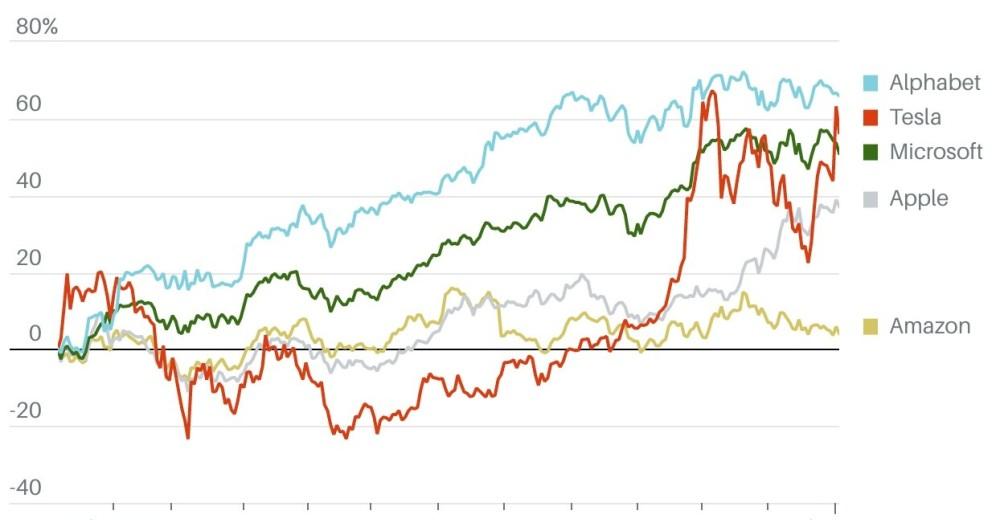It's no secret that over the past few years, the total returns of the U.S. stock market have relied heavily on the performance of several big tech giants — well-known companies like Apple, Alphabet, and Amazon.
It's clear that these companies will continue to have a significant impact on overall U.S. stock returns in 2022 — not least because they have a large weight in the S&P 500 index.
But UBS strategists say they may no longer be the best option for finding excess returns in the tech industry.
No longer optimistic about tech giants
Before the recent decline in tech stocks, Apple became the first public company with a market capitalization of more than $3 trillion.
A team led by Mark Haefele, chief investment officer of UBS Global Wealth, said Apple's market capitalization reflects the S&P 500's reliance on tech giants.
In 2021, the S&P 500 index returned nearly 29 percent annually, with the top five contributors — Apple, Microsoft, Nvidia, Google, and Tesla — contributing 8.8 percentage points, including dividend returns.
The UBS team notes that in 1985, the top five contributors accounted for less than 4 percentage points of total return.
Today, the largest stocks in the S&P 500 — Apple, Microsoft, Alphabet, Amazon and Tesla — account for 23 percent of the index, a figure that UBS strategists say is very high relative to history.
"While this weighting means that these stocks will have a significant impact on broader-cap returns, we no longer see them as the best option for finding excess returns in the tech industry," Haefele and his team said, adding that "artificial intelligence, big data, and cybersecurity are expected to bring more returns." ”

What to buy this year?
UBS expects the broader AI market to grow at a rate of 20% per year to reach $90 billion by 2025, representing 2.5-fold growth over the next five years.
If the application of AI in computing power, machine learning, and deep learning develops faster, the expansion of the industry may be faster.
When it comes to big data, Haefele and his team expect that global data capacity will expand more than 10 times over the next decade — the equivalent of 610 128GB iPhones per person on the planet.
"The outlook for big data is largely driven by rising internet penetration and data usage in large economies such as China, India and Indonesia," UBS said.
They're also seeing a surge in connected devices including refrigerators, cars and wind turbines. And it is expected that from 2020 to 2025, the market for big data solutions that process this information will grow at an annual rate of 8%.
When it comes to cybersecurity, UBS believes that investment spending in the sector will increase as cybercrime increases widely.
Citing Norton's Cybersecurity Watch 2021, UBS strategists highlight that nearly 330 million people experienced cybercrime in 2021 and spent about 2.7 billion hours dealing with follow-up issues.
"Industries working to prevent such attacks are expected to grow by an average of 10% over the 2020-25 period due to steady increases in enterprise IT spending and widespread adoption of cloud security," Haefele said. "Cybersecurity is also one of the most defensive parts of IT; there is limited downside to spending on this area."
UBS expects the broader technology sector to see revenue growth in the mid-to-high single digits or more each year during 2020-2025. For these three thematic industries, UBS expects an average annual revenue growth of 10% and an average annual revenue growth of 16%.